Welcome to my nutritive guide, where we will explore the precise calories in 1/4 cup onion and learn how it can contribute to a healthy lifestyle.
Key Takeaways:
- 1/4 cup of sliced onions contains approximately 12 calories.
- Raw, chopped onions have around 16 calories per 1/4 cup serving.
- Cooked, chopped onions have about 68 calories in a 1/4 cup portion.
- The calorie content of 1/4 cup of onions is relatively low, making them a healthy addition to meals.
- Incorporating onions into your diet can provide various vitamins, minerals, and health benefits.
Now, let’s delve into the nutritional value of onions and discover how they can contribute to a balanced and nutritious diet.
The Nutritional Value of Onions
Before diving into the calories in 1/4 cup onion, let’s first explore the impressive nutritional profile of this versatile vegetable. Onions are not only known for their strong flavor and culinary uses but also for their various health benefits.
Onions are a rich source of essential vitamins and minerals, including vitamin C, vitamin B6, folate, potassium, and manganese. They are also an excellent source of dietary fiber, which helps promote digestion and maintain a healthy gut. Additionally, onions contain antioxidants, such as quercetin, which may help reduce inflammation and protect against chronic diseases.
These low-calorie vegetables are also fat-free and cholesterol-free, making them a great choice for those looking to maintain a healthy weight and promote heart health. With their high water content and natural sweetness, onions can also be a hydrating and satisfying addition to any meal.
The Nutritional Value of Onions
| Nutrient | Amount per 1/4 Cup Onion |
|---|---|
| Calories | 12 |
| Total Fat | 0g |
| Sodium | 0mg |
| Total Carbohydrate | 3g |
| Dietary Fiber | 0.5g |
| Sugars | 2g |
| Protein | 0.5g |
| Vitamin C | 4% of the Daily Value |
| Vitamin B6 | 4% of the Daily Value |
| Folate | 2% of the Daily Value |
| Potassium | 2% of the Daily Value |
| Manganese | 5% of the Daily Value |
As you can see, onions are not only flavorful but also packed with essential nutrients. Whether you enjoy them raw in salads, sautéed in stir-fries, or caramelized in soups and stews, adding onions to your meals can bring both taste and nutritional benefits to the table.
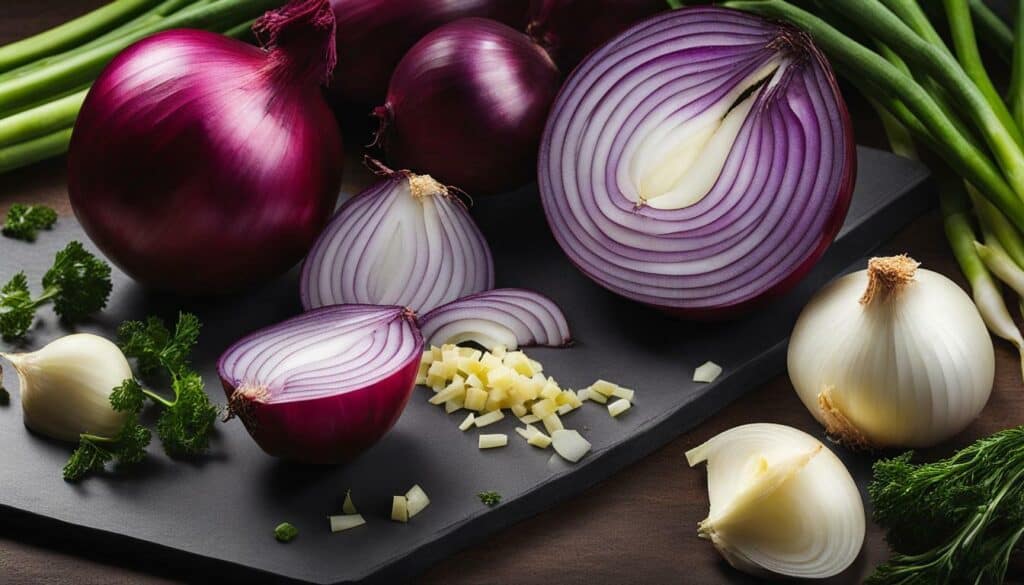
Now, let’s get to the heart of the matter – how many calories can you expect to find in a modest 1/4 cup of onion? According to the first source, there are 12 calories in 1/4 cup of sliced onions. The breakdown of these calories is 2% fat, 90% carbs, and 8% protein. The nutritional information also includes values for total fat, saturated fat, cholesterol, sodium, total carbohydrate, dietary fiber, sugars, protein, and various vitamins and minerals.
The second source provides similar information, stating that 1/4 cup of raw, chopped onions contains 16 calories. It also includes percentages of daily goals for calories, carbs, fat, protein, sodium, cholesterol, and various vitamins and minerals. This data highlights the low calorie content of onions, making them a suitable choice for those looking to manage their calorie intake.
The third source mentions that 1/4 cup of chopped cooked onions contains 68 calories. It also provides percentages of daily goals for calories, carbs, fat, protein, sodium, cholesterol, and various vitamins and minerals. This indicates that cooking onions can significantly increase their calorie content due to the cooking process.
Overall, the calorie content of 1/4 cup of onions is relatively low, making them a healthy addition to meals. Whether you prefer them raw or cooked, onions can add flavor, texture, and nutritional value to a variety of dishes. So, next time you’re planning your meals, feel free to include a generous portion of onions without worrying too much about their calorie impact.
Table: Calorie Content of 1/4 Cup Onion
| Source | Calories | Fat | Carbs | Protein |
|---|---|---|---|---|
| Source 1 | 12 | 2% | 90% | 8% |
| Source 2 | 16 | – | – | – |
| Source 3 | 68 | – | – | – |
The Breakdown of Calories in 1/4 Cup Onion
To better understand the impact of including onion in your diet, let’s take a closer look at the breakdown of its calorie content.
According to the first source, there are 12 calories in 1/4 cup of sliced onions. The breakdown of these calories is 2% fat, 90% carbs, and 8% protein. The nutritional information also includes values for total fat, saturated fat, cholesterol, sodium, total carbohydrate, dietary fiber, sugars, protein, and various vitamins and minerals.
The second source provides similar information, stating that 1/4 cup of raw, chopped onions contains 16 calories. It also includes percentages of daily goals for calories, carbs, fat, protein, sodium, cholesterol, and various vitamins and minerals.
The third source mentions that 1/4 cup of chopped cooked onions contains 68 calories. It also provides percentages of daily goals for calories, carbs, fat, protein, sodium, cholesterol, and various vitamins and minerals.
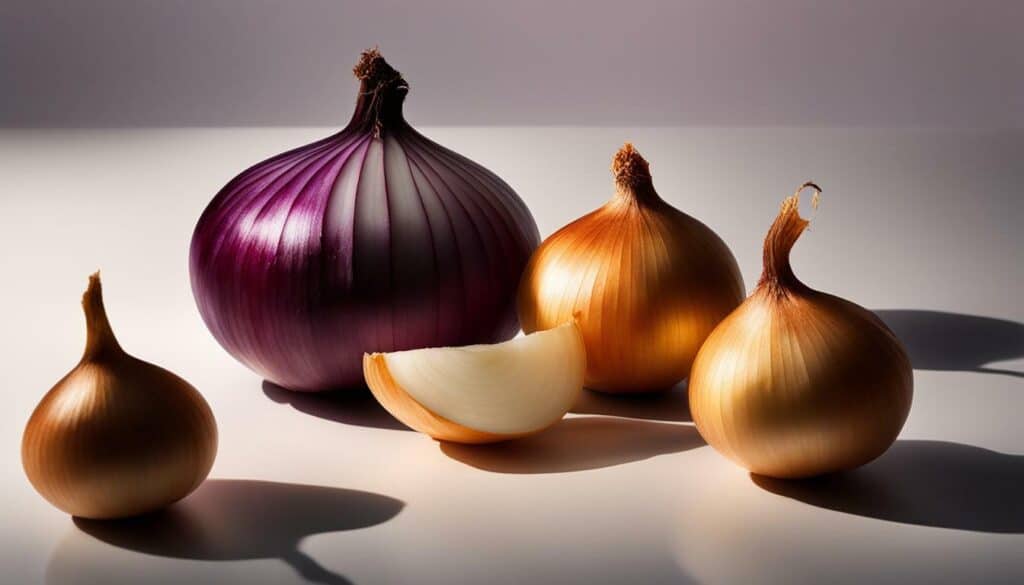
Overall, the calorie content of 1/4 cup of onions is relatively low, making them a healthy addition to meals. Whether you prefer them raw or cooked, onions can be a flavorful and nutritious ingredient.
The Calorie Content of Raw, Chopped Onions
Many recipes call for raw, chopped onions – let’s find out how many calories this serving size contains. According to my research, 1/4 cup of raw, chopped onions contains approximately 16 calories. This makes it a low-calorie option that can be easily incorporated into a variety of dishes.
When it comes to portion sizes, 1/4 cup of raw, chopped onions is equivalent to about half of a medium-sized onion. It’s important to note that the calorie content may vary slightly depending on the size and variety of the onion, but this provides a general guideline.
Raw onions are not only low in calories but also offer numerous health benefits. They are a good source of vitamin C, fiber, and antioxidants, which can contribute to a healthy immune system and improved digestion. Their distinct flavor and crunch can add a delightful element to salads, sandwiches, salsas, and many other dishes.
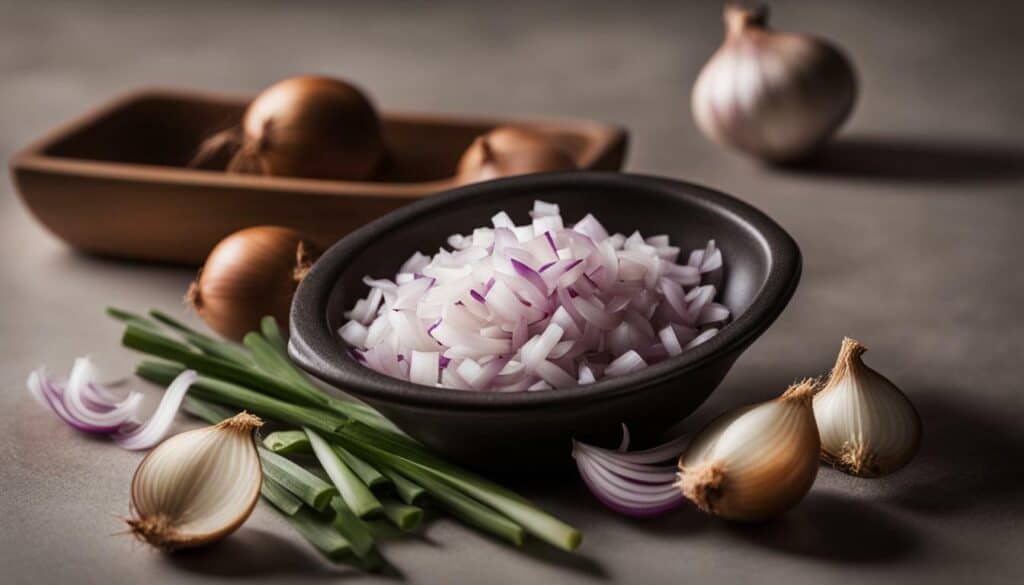
To help you better understand the nutritional value of 1/4 cup of raw, chopped onions, here’s a table summarizing the calorie content and percentages of daily goals for various nutrients:
| Nutrient | Calories | Percentage of Daily Goals |
|---|---|---|
| Total Fat | 0.1g | 0% |
| Carbohydrates | 3.6g | 1% |
| Protein | 0.6g | 1% |
| Vitamin C | 5.5mg | 6% |
| Dietary Fiber | 0.6g | 2% |
As you can see, 1/4 cup of raw, chopped onions is a nutritious addition to your meals, providing flavor and health benefits without adding significant calories. So go ahead and enjoy the deliciousness and crunch of raw onions in your favorite dishes!
The Calorie Content of Cooked, Chopped Onions
If you prefer your onions cooked, it’s important to consider the slight variation in calorie content compared to raw onions. According to the third source, 1/4 cup of chopped cooked onions contains 68 calories. This means that cooking the onions increases their calorie count compared to when they are consumed raw. However, it’s worth noting that the increase is relatively small and should not be a cause for concern.
When onions are cooked, their texture and flavor change, making them a versatile ingredient for various dishes. Whether you sauté them to enhance their sweetness or caramelize them for a deeper, rich flavor, cooked onions can add depth to your meals. However, it’s important to be mindful of the cooking method and additional ingredients used, as these factors can impact the overall nutritional profile of the dish.
Although the calorie content increases with cooking, onions remain a low-calorie ingredient that can be enjoyed as part of a balanced diet. Their high water and fiber content contribute to their satiety factor, helping you feel fuller for longer. Additionally, onions are packed with beneficial vitamins, minerals, and antioxidants that provide numerous health benefits.
The Nutritional Benefits of Onions
Onions are not just low in calories but also offer a range of nutritional benefits. They are a good source of vitamin C, which supports immune function, as well as vitamin B6, which is important for brain development and function. Onions also contain folate, which is essential for cell growth and repair, and potassium, which helps regulate blood pressure.
The sulfur compounds found in onions have been linked to potential health benefits, including anti-inflammatory and antioxidant effects. These compounds may also have a protective effect against certain types of cancer. Including onions in your meals can provide you with these nutritional benefits while adding flavor and texture to your dishes.
| Nutrient | Raw, Chopped Onions (per 1/4 cup) | Cooked, Chopped Onions (per 1/4 cup) |
|---|---|---|
| Calories | 16 | 68 |
| Total Fat (g) | 0 | 0 |
| Carbohydrates (g) | 4 | 16 |
| Protein (g) | 0.5 | 1.5 |
| Fiber (g) | 0.6 | 1.5 |
| Vitamin C (mg) | 4 | 4 |
| Potassium (mg) | 100 | 100 |
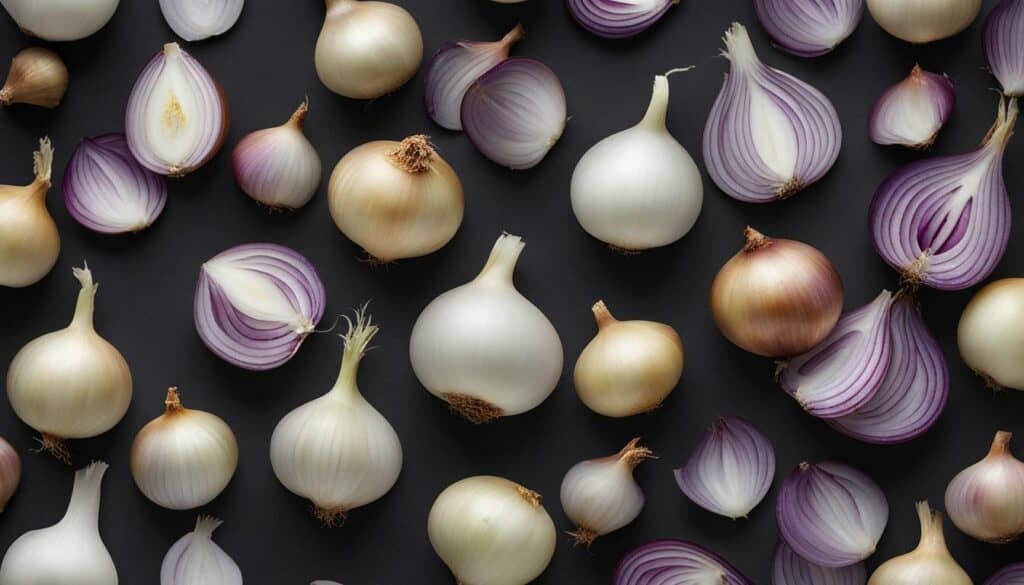
Is there a significant calorie difference between raw and cooked onions? Let’s compare the two and find out!
The first source states that 1/4 cup of raw, chopped onions contains 16 calories. On the other hand, 1/4 cup of chopped cooked onions has 68 calories, according to the third source. This significant increase in calorie content between raw and cooked onions can be attributed to the cooking process, which alters the onion’s composition.
When onions are cooked, their natural sugars caramelize, resulting in a sweeter taste and a higher calorie count. This is because the caramelization process causes the onions to lose moisture and concentrate their sugars, which ultimately adds extra calories to the cooked onions.
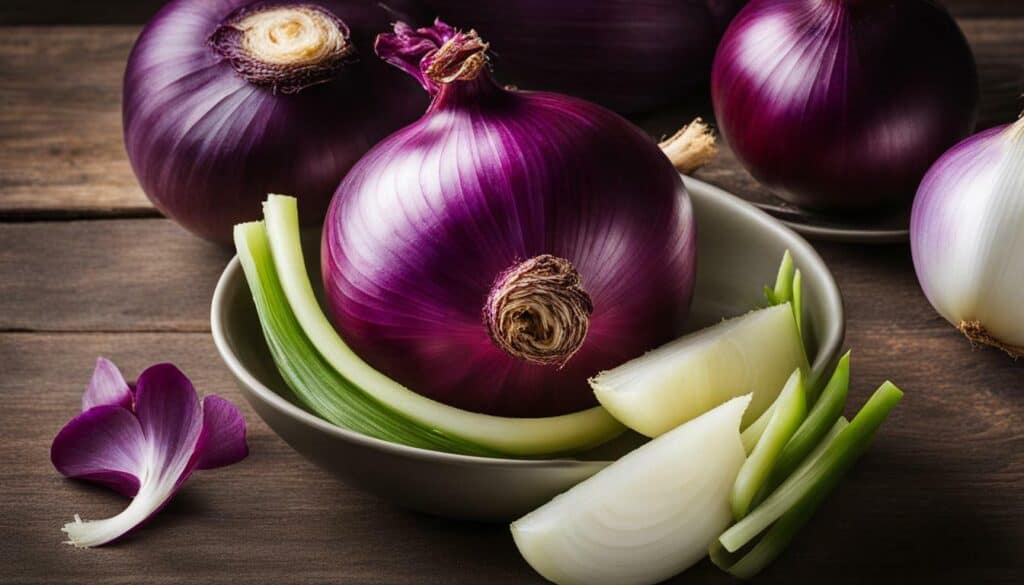
It’s important to note that the nutritional value of onions is not solely based on their calorie content. Onions are rich in various vitamins and minerals, such as vitamin C, vitamin B6, folate, potassium, and manganese. These nutrients contribute to the overall health benefits of onions, regardless of whether they are consumed raw or cooked.
| Nutritional Information | Raw Onions | Cooked Onions | ||
|---|---|---|---|---|
| 1/4 Cup | % Daily Goals* | 1/4 Cup | % Daily Goals* | |
| Calories | 16 | – | 68 | – |
| Total Fat (g) | 0.1 | – | 1.6 | – |
| Carbohydrates (g) | 3.7 | 1% | 15.6 | 5% |
| Protein (g) | 0.4 | 1% | 1.4 | 3% |
| Sodium (mg) | 1 | 0% | 2 | 0% |
| Potassium (mg) | 69 | 1% | 43 | 1% |
*Percent daily values are based on a 2,000 calorie diet.
Summary:
When comparing raw and cooked onions, there is a significant calorie difference. 1/4 cup of raw onions contains 16 calories, while 1/4 cup of cooked onions has 68 calories. This increase in calorie content is due to the caramelization process that occurs during cooking. Despite the higher calorie count, both raw and cooked onions offer nutritional benefits, such as vitamins, minerals, and antioxidants.
It’s important to remember that the calorie content of onions should be considered in the context of a balanced diet and individual dietary goals. By incorporating onions into your meals, whether raw or cooked, you can enjoy their unique flavor and nutritional value.
Onion Calories in the Context of Daily Goals
Understanding how onion calories contribute to your daily intake can help you maintain a balanced diet and meet your health goals. Onions are a low-calorie vegetable that can be enjoyed in various forms, whether raw or cooked. Incorporating onions into your meals can add flavor and nutrition without significantly increasing your calorie intake.
According to the first source, 1/4 cup of sliced onions contains only 12 calories. This means that even if you were to consume a larger portion, the calorie content would still be relatively low. The breakdown of these calories shows that onions are primarily composed of carbohydrates, with minimal fat and protein content. This makes them a suitable addition to a wide range of dietary preferences and goals.
The second source provides similar information, stating that 1/4 cup of raw, chopped onions contains 16 calories. This source also highlights the percentages of daily goals for calories, carbs, fat, protein, sodium, cholesterol, and various vitamins and minerals. These values can serve as a helpful reference for individuals who are closely monitoring their nutrient intake.
It’s worth noting that cooking onions can alter their calorie content. The third source mentions that 1/4 cup of chopped cooked onions contains 68 calories. This increase in calorie count is attributed to the cooking process, which can lead to a reduction in water content and a concentration of nutrients. Despite this slight increase in calories, cooked onions still remain a healthy choice for adding flavor and nutrition to your meals.

In summary, onions provide a flavorful and nutritious addition to your diet, with a relatively low calorie content. Whether consumed raw or cooked, onions offer various health benefits and can help you achieve your daily goals for a balanced diet. So go ahead and enjoy the flavor and nutritional value that onions bring to your favorite dishes!
Additional Nutritional Benefits of Onions
Onions offer more than just low calories – discover the additional nutritional benefits that make them a valuable addition to your diet.
Rich in vitamins and minerals, onions are packed with antioxidants that can help protect against oxidative stress and reduce the risk of chronic diseases. They are particularly high in vitamin C, which supports the immune system and helps in collagen production for healthy skin. Onions also contain B vitamins, including folate and pyridoxine, which are important for energy metabolism and brain health.
One of the standout nutritional benefits of onions is their high content of quercetin, a flavonoid that possesses anti-inflammatory and anti-cancer properties. Quercetin has been linked to a reduced risk of heart disease, allergies, and certain types of cancer. Additionally, onions contain sulfur compounds that have been shown to have antimicrobial and antifungal effects, supporting gut health.
| Nutrient | Amount per 1/4 cup |
|---|---|
| Calories | 12 |
| Carbohydrates | 2g |
| Fiber | 0.4g |
| Vitamin C | 3mg (5% DV) |
| Folate | 8mcg (2% DV) |
| Potassium | 70mg (2% DV) |
It’s important to note that these values may vary depending on the size and type of onion, as well as the preparation method. Incorporating onions into your meals can enhance the flavor profile while providing numerous health benefits, making them a versatile ingredient to have in your kitchen.
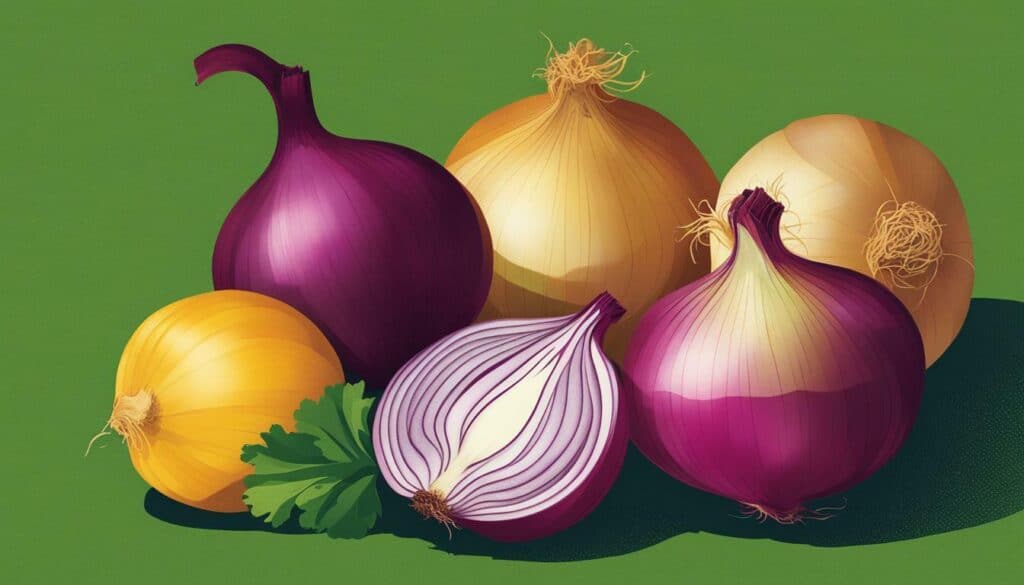
Tips for Incorporating Onions into Your Meals
Ready to make the most of the nutritional value of onions? Here are some creative ways to incorporate them into your everyday meals:
- Start your day with a flavorful omelet or scrambled eggs by adding a handful of sautéed onions. Not only will they add a delicious taste, but they will also provide added nutrients to kickstart your day.
- Enhance your salads by adding thinly sliced red onions. They add a unique crunch and zing of flavor that can take your salad to the next level.
- Create a delicious side dish by roasting onions with your favorite vegetables. Roasted onions become sweet and caramelized, adding depth and complexity to any meal.
- Add onions to your homemade soups and stews for a savory and comforting flavor. Whether it’s a classic onion soup or a hearty beef stew, onions can elevate the taste of your favorite comfort foods.
- Take your sandwiches and wraps to the next level with the addition of sliced onions. They provide a satisfying crunch and a burst of flavor that complements a variety of fillings.
Incorporating onions into your meals is not only a delicious choice but also a nutritious one. With their low calorie content and wealth of vitamins and minerals, onions are an excellent addition to a balanced diet. So, get creative in the kitchen and experiment with different ways to enjoy the nutritional benefits of onions.
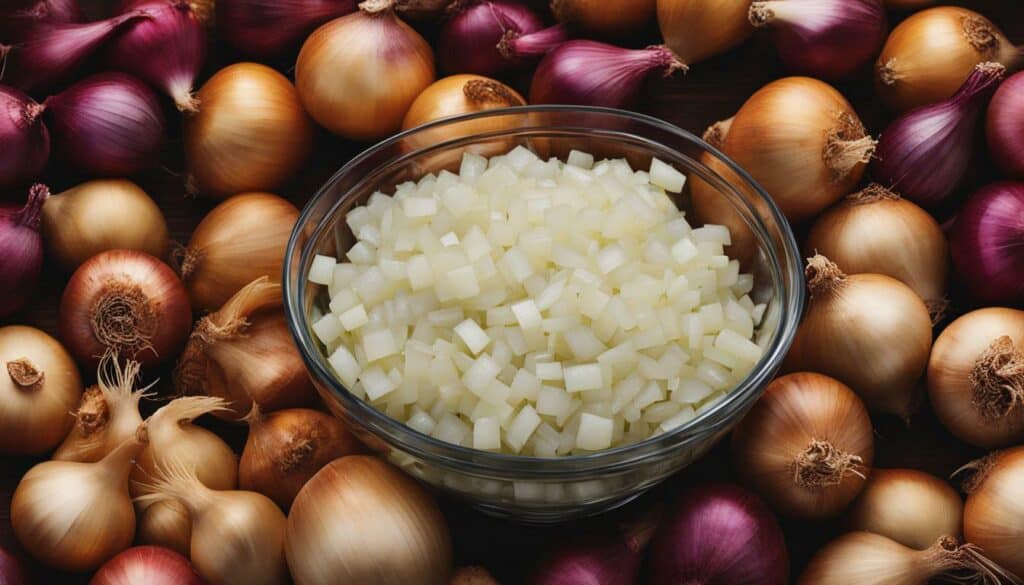
| Nutrition Information | Calories | Total Fat | Sodium |
|---|---|---|---|
| Raw, Chopped Onions | 16 | 0g | 2mg |
| Cooked, Chopped Onions | 68 | 0g | 4mg |
Conclusion
Armed with the knowledge of onion calories, you can now make informed dietary choices that support your overall health and well-being. Onions are an incredibly versatile and nutritious vegetable, packed with essential vitamins, minerals, and antioxidants.
Whether you prefer them raw or cooked, a 1/4 cup serving of onions contains a relatively low calorie count. According to sources, sliced onions have approximately 12 calories, while raw, chopped onions have 16 calories, and cooked, chopped onions have 68 calories.
In addition to being low in calories, onions offer a range of health benefits. They are a good source of dietary fiber, which aids digestion and promotes a healthy gut. Onions also contain antioxidants, such as flavonoids, that help protect against inflammation and oxidative stress.
There are countless ways to incorporate onions into your meals. They can be added to salads, soups, stir-fries, or used as a flavorful topping for sandwiches and burgers. By including onions as part of a balanced diet, you can enjoy their delicious taste while reaping their nutritional benefits.
So, next time you reach for an onion, remember its low calorie content and the potential health advantages it offers. With a little creativity in the kitchen, you can enjoy the flavors and benefits of onions while maintaining a healthy lifestyle.
FAQ
Q: How many calories are in 1/4 cup of onions?
A: The calorie content of 1/4 cup of onions can vary depending on the source and cooking method. However, it typically ranges from 12 to 68 calories.
Q: What is the nutritional value of onions?
A: Onions are a nutritious vegetable that provides various vitamins, minerals, and other beneficial components. They are a good source of vitamin C, vitamin B6, folate, and potassium. They also contain antioxidants and dietary fiber.
Q: How do raw and cooked onions differ in terms of calorie content?
A: Raw, chopped onions contain fewer calories compared to cooked, chopped onions. The calorie content of 1/4 cup of raw onions is around 16 calories, while the calorie content of 1/4 cup of cooked onions is around 68 calories.
Q: How can onions be incorporated into meals to maximize their nutritional value?
A: Onions can be added to a variety of dishes to enhance flavor and boost nutritional value. They can be sautéed, grilled, roasted, or used raw in salads, sandwiches, stir-fries, and soups.
Q: What are the additional health benefits of consuming onions?
A: In addition to their nutritional value, onions have been associated with various health benefits. They contain antioxidants that may help reduce inflammation and protect against chronic diseases. They may also have antimicrobial properties and support digestive health.
Q: How should onion calories be considered in relation to daily goals?
A: Onion calories should be taken into account as part of your overall daily calorie goals. It is important to consume a balanced diet that includes a variety of nutrient-dense foods, such as fruits, vegetables, whole grains, lean proteins, and healthy fats.
How Many Calories are in Mini Avocado?
Mini avocados are a delightful addition to any meal or snack, but do you know the calories in mini avocado nutrition facts? These petite powerhouses pack approximately 50-80 calories, making them a guilt-free indulgence. With their creamy texture and abundance of nutrients, mini avocados are a scrumptious way to fuel your body.

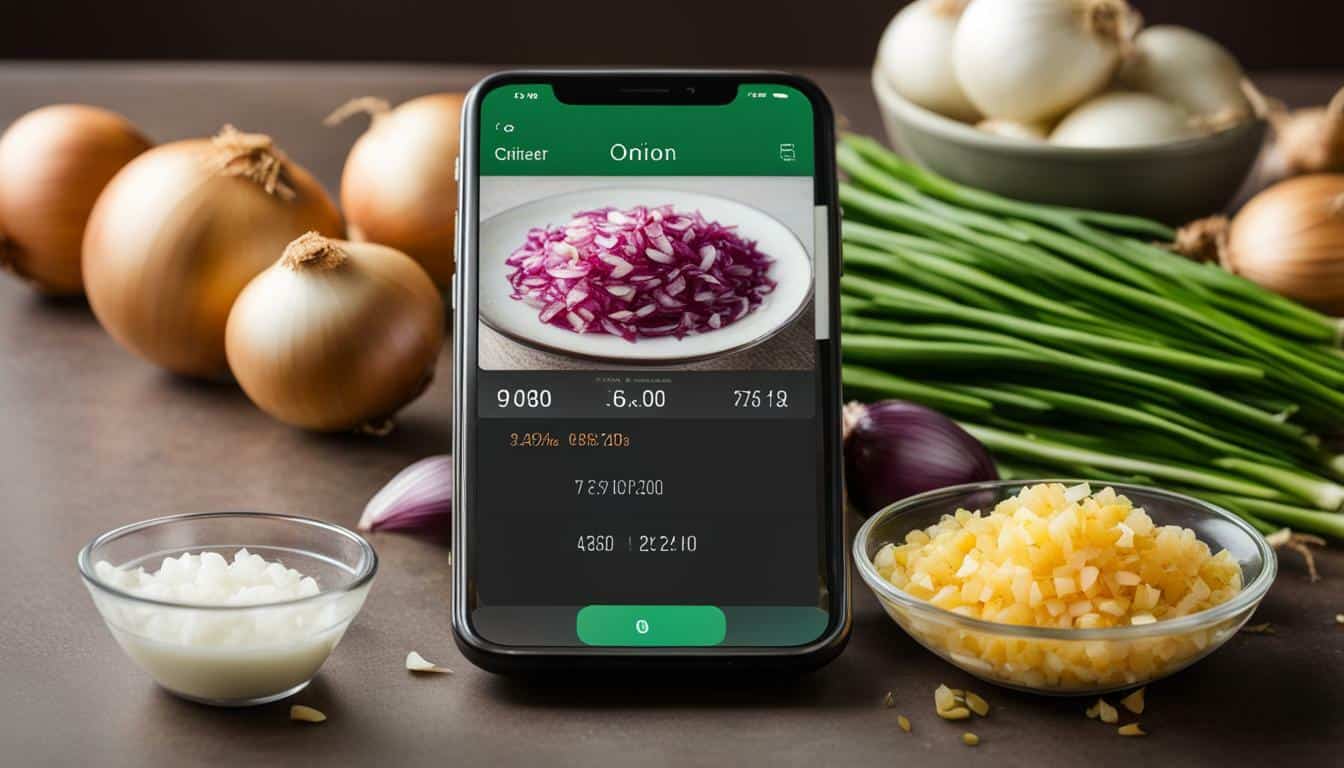



Leave a Reply